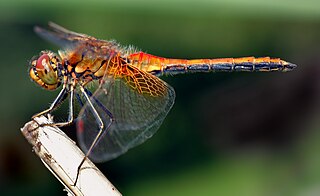
A dragonfly is an insect belonging to the order Odonata, infraorder Anisoptera. Adult dragonflies are characterized by large, multifaceted eyes, two pairs of strong, transparent wings, sometimes with coloured patches, and an elongated body. Dragonflies can be mistaken for the related group, damselflies (Zygoptera), which are similar in structure, though usually lighter in build; however, the wings of most dragonflies are held flat and away from the body, while damselflies hold their wings folded at rest, along or above the abdomen. Dragonflies are agile fliers, while damselflies have a weaker, fluttery flight. Many dragonflies have brilliant iridescent or metallic colours produced by structural colouration, making them conspicuous in flight. An adult dragonfly's compound eyes have nearly 24,000 ommatidia each.

Aeshna isoceles is a small hawker dragonfly that is found in Europe, mostly around the Mediterranean, and the lowlands of North Africa. Its common name in English is green-eyed hawker. In Britain it is a rare and local species and is known as the Norfolk hawker. It has a brown colour with green eyes and clear wings and also a yellow triangular mark on the second abdominal segment which gave rise to its scientific name. It used to be in the genus Anaciaeschna as it has several differences from the other members of the genus Aeshna. Its specific name is often spelt isosceles.
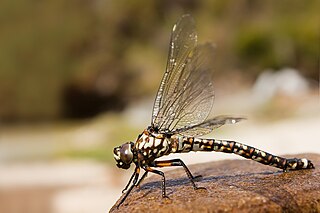
The Aeshnidae, also called aeshnids, hawkers, or darners, is a family of dragonflies. The family includes the largest dragonflies found in North America and Europe and among the largest dragonflies on the planet.
Hawker or Hawkers may refer to:
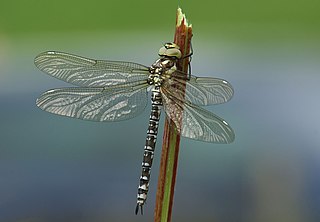
Aeshna, or the mosaic darners, is a genus of dragonflies from the family Aeshnidae. Species within this genus are generally known as "hawkers" or "darners".

The southern hawker or blue hawker is a species of hawker dragonfly.

The common hawker, moorland hawker or sedge darner is one of the larger species of hawker dragonflies. It is native to Palearctic and northern North America. The flight period is from June to early October.

The azure hawker is one of the smaller species of hawker dragonflies,. The flight period is from late May to August
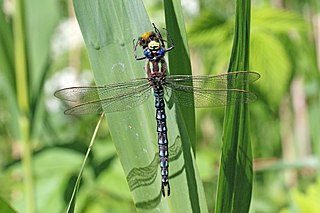
Brachytron is a monotypic genus of European dragonfly of the family Aeshnidae containing the hairy dragonfly, also known as the hairy hawker or spring hawker.
Pinheyschna meruensis is a species of dragonfly in the family Aeshnidae. It is found in Kenya, Tanzania, and Uganda. Its natural habitats are subtropical or tropical dry forests, subtropical or tropical moist lowland forests, subtropical or tropical dry shrubland, rivers, and intermittent rivers.
Pinheyschna yemenensis is a species of dragonfly in the family Aeshnidae. It is endemic to Yemen, where its natural habitat is mountain streams above 2000 m above sea level. It is threatened by a loss of this habitat.

Anaciaeschna is a genus of dragonflies in the family Aeshnidae. Species of Anaciaeschna are found in Africa, Asia and Australia.
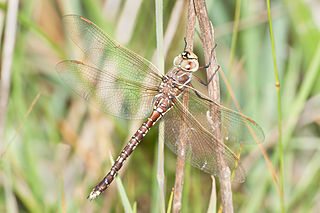
The blue-spotted hawker, scientific name Adversaeschna brevistyla, is the only known species of dragonfly of the genus Adversaeschna in the family Aeshnidae.

Sandhurst to Owlsmoor Bogs and Heaths is an 85.8-hectare (212-acre) biological Site of Special Scientific Interest (SSSI) on the northern outskirts of Sandhurst in Berkshire. Part of the SSSI is Wildmoor Heath nature reserve, which is managed by the Berkshire, Buckinghamshire and Oxfordshire Wildlife Trust. and the SSSI is part of Thames Basin Heaths Special Protection Area.
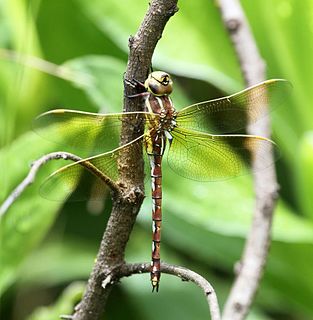
Zosteraeschna minuscula, the friendly hawker is a species of dragonfly in family Aeshnidae. It is found in South Africa and Namibia. Its natural habitats include ponds and still pools in montane streams.

Zosteraeschna is the scientific name of a genus of dragonflies from the family Aeshnidae. These relatively large dragonflies are also known as hawkers. They are dark brown with yellow-green markings; On the abdomens of the males, much of the top of S2 and base of S3 are blue.

Englemere Pond is a 26.1-hectare (64-acre) biological Site of Special Scientific Interest on the southern outskirts of North Ascot in Berkshire. The site is also a Local Nature Reserve. It is owned by the Crown Estate and managed by Bracknell Forest Borough Council.













